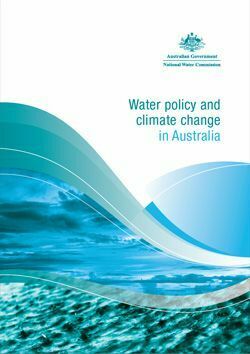 The Commission’s 2011 Biennial Assessment pointed to the interactions between water and associated areas of policy including natural resource management, energy, and climate change. The assessment suggested that given the recent development and implementation of climate change policy initiatives it would be prudent to analyse the interactions between climate change and water in further detail. This newly released Water policy and climate change in Australia report was commissioned in response to that need.
The Commission’s 2011 Biennial Assessment pointed to the interactions between water and associated areas of policy including natural resource management, energy, and climate change. The assessment suggested that given the recent development and implementation of climate change policy initiatives it would be prudent to analyse the interactions between climate change and water in further detail. This newly released Water policy and climate change in Australia report was commissioned in response to that need.
The Report provides a comprehensive analysis of the interactions between climate change policy and water policy across seven key sectors that supply water, use water or otherwise affect water policy. These were urban water, rural water, the environment, agriculture, electricity generation, forestry and mining. An assessment framework was used to identify and assess the potential impacts on water resources and service provision of:
- climate change mitigation policies or actions designed to reduce greenhouse gas emissions
- climate change adaptation policies or actions designed to better manage the impacts and/or risks associated with climate change.
Based on this assessment, the report makes five overarching recommendations to address areas where improvement is warranted. They focus on areas assessed to be priorities because of the high ‘materiality of climate change related impacts, and because current policy settings may be insufficient to deal with changes brought about by climate change. Each recommendation is supported by a number of more detailed actions. Follow this link to learn more about the Water policy and climate change in Australia report.